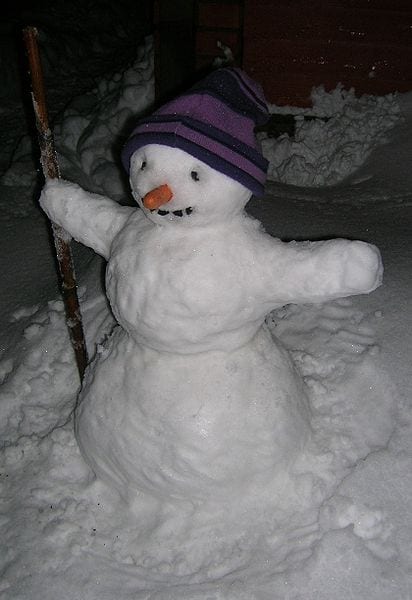by Rebecca Bratten Weiss
We first watched the animated silent movie The Snowman at my uncle’s house in New Hampshire, in the Christmas of 1993. We could not have watched it at home prior to that, because we had lived with no television for nine years. That Christmas we could not have watched it at home in any case, because we were without a home, which was why we spent the holiday season visiting family.
It was strange, that Christmas, not to participate in the rituals of the season in the big drafty room in the hundred-year-old Ohio farmhouse that had stood abandoned and vandalized until we moved in. We had scrubbed the graffiti from the walls as best we could, learned how to survive the icy winters huddled around the wood stove, while arctic winds howled over the hill and the water in the bathroom froze solid. If we wanted water to drink, wash, or flush the toilet we had to go out to the spring, through that blinding whiteness, with gallon jugs or buckets. As a teenager desperate to wash my hair and not look like a greasy hobo, I would do it. But begrudgingly.
The rooms with their ten-foot ceilings didn’t hold the heat well but could accommodate gigantic Christmas trees, as wide as they were tall. We never cut our trees at a farm, but always found a way to procure them in the wild. For years this meant driving with dad in his beat-up red Toyota truck up the icy back roads up what seemed a small mountain, to the Camaldolese monastery ringed about with pines, where my sister and I understood we could not go in, because the monks were forbidden to talk to women for some reason, but dad would bring them a loaf of mom’s fresh baked bread and beg to cut a tree. I liked to imagine the monks as very holy with long white beards. I now understand that they are probably not holy at all, beards or not.
Over the years the trees by the monastery got taller and taller, while dad got older and heavier, but had to climb ten or fifteen feet to top a tree for our Christmas cheer. Watching this climb grew more fraught over the years, but it was a matter of pride for him not to accept my offer to do the cutting myself, nor ever to get a tame farm-raised tree. After dad had succeeded in topping the tree without falling to his death we had to drag the monster tree some half a mile out of the woods, through thorns and undergrowth, hoist it into the truck, tie it as best we could, and rollick back down the road hoping we wouldn’t skid off a cliff or see the tree careening out of the truck bed.
Those trees were so huge it took dad days to put up string upon string of dangerously elderly lights, and the family to hang our collection of ornaments dating back to the 1920s. Once the tree was adorned, I liked to creep back into the corner where it abutted the wall. There I could crouch with my hot cocoa and a book, looking at the glow of the lights and the shadows through the boughs, listening to Isaac Stern play Schubert’s “Ave Maria.” What I thought about there hidden behind the tree is hard to articulate. Generally, that something magical was coming, someday, somehow. But also that something wonderful was probably lost beyond recall.
When we were forced to leave that house, I had already gone away to college, but it was a shock to have no home to return to. Our home was no longer our home. No more corner with flickering lights. No more sledding down the long hill where you had to watch out or you’d crack your skull on a fencepost, when you shot the gap in the barbed wire. No more window looking out onto the grassy hill at the horses grazing, or swinging from the bough of the tall oak, or the smell of wet moss by the spring.
All our belongings were packed untidily into different storage buildings, none of them secure or watertight. Today when I unpack the advent calendars my grandmother purchased in the 1950s, let my kids choose which will be theirs for the season, I wonder how they survived my family’s peregrinations, house fires, homelessness, the disintegrating chapel where I stored my stuffed animals to be recalled once I had a home again, but where the rains came and rotted them beyond recollection.
Maybe we carried our advent calendars with us? I’m not sure. Certainly, at our uncle’s house we would have seen similar ones. Also similar lights on a tree also cut in the wild, nothing tame or trim for our family. We would have listened to similar music. But we were not at home and didn’t know when or where we would be again.
It was a good visit, though. We learned to drink White Russians, and cross-country ski. And one evening we watched The Snowman: the simplest story ever, not even especially original or profound, the story of a child who has one brief magical encounter on a winter’s day, and then everything returns to normal.
The boy builds the snow man. They go on adventures. They fly to the North Pole. Santa gives the child a scarf. They go home. The boy goes to bed, and in the movie as you see him nestling down in his blankets on the long dark winter night, the smile on his face as he drifts to sleep, you remember those winter nights, the lights flickering from the tree in the other room, as you too drifted to sleep, thinking of all the wonderful things that might be or not be.
In the morning when he wakes up, the snow man has melted. Music plays – the same music we heard as they flew across the seas and mountains, passing castles and cruise ships and wales—and the boy reaches into his pocket, pulls out the scarf that Santa gave him. So it was real.
Yet apparently in the book on with the movie is based, there was no scarf. Either it had not been real? Or there was no way to prove it was real?
The flying scene is the best, of course, mostly because of the music, but also because of the way the boy and the snow man leap and bound and break free from gravity, soaring across half of Europe, above it all. When we watched the movie dad would talk about the dreams he had about flying, which were just like that—you leap, and you leap, and suddenly gravity has no more power over you. I have those dreams too.
We watched The Snowman again this Christmas, but without my brother and sister being here, since the pandemic makes it impossible or unsafe for them to travel. We watched it without dad because he died in April. Separated by land and ocean, by time and death and the grave, we are trying to keep alive the old Christmas rituals, lighting the lights that helped us believe something magical was coming, but also knowing how much is lost beyond recall.
We discussed, briefly, the two different endings of the story. Does the boy find the scarf or not find the scarf? Was it a dream or reality? Some of us like the film version better, when he finds the scarf, and knows it was really real.
As usual I googled the story behind the story, and here’s what Raymond Briggs, the author of The Snowman had to say:
“I don’t have happy endings. I create what seems natural and inevitable. The snowman melts, my parents died, animals die, flowers die. Everything does. There’s nothing particularly gloomy about it. It’s a fact of life.”
Dad believed vehemently in resurrection, which was part of the reason why we lived so strangely, squatting in abandoned houses, trading bread for trees, looking out for the end of the world, never letting ourselves be too tethered to this earthly life. For him the flying dreams, like dreams children have of Jesus in a golden corridor, or near-death experiences where people see bunnies in heaven, point to an afterlife. For me they point to the fact that we humans want desperately to believe in resurrection, in the something-more, which is also why we have built elaborate tombs and poured libations and written poems in which the dead come to us bearing words of warning.
This winter when the snow falls and I walk around at night I have been waiting for dad to come striding down from the graveyard to meet me, to give me some warning. It might be as simple as “the drought will be bad next year.” It might be “Jesus is coming again.” Either way, these are warnings I’ve heard all my life. I miss hearing them now. I’d give a lot to hear him tell me once again that we’ve a hard year coming, even though I know it anyway.
As a writer I don’t do happy endings either. The things we love on earth are ephemeral. We can’t go home again, at least not to the home we were looking for, the one we remember. Still, even if I can’t say “of course, the boy wakes up and finds the scarf in his pocket”–I can’t say he doesn’t.
https://commons.wikimedia.org/wiki/File:Snowman_2009-12-23.jpg













